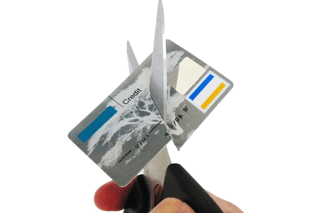 Do any of the following situations sound familiar?
Do any of the following situations sound familiar?
- Do you have creditors breathing down your neck, constantly applying pressure on you for payment?
- Are you at the point where you have stopped answering the phone, hoping the important callers will leave a message, just to avoid talking to your creditors?
- Are you constantly worried when your employer will be contacted and your paycheck will start being affected?
If yes, know that you are not alone. Harassing creditors can add a tremendous amount of stress, worry and concern to your life that is already tense because of your current financial situation. You aren’t doomed -there are ways out of this unfortunate situation. Here are 5 ideas to consider that apply to various stages of debt:
#1 – Pay Off Your Debt
If you are financially able to make payments on your debt, then do. If you can’t make the full payments, talk to your creditors and ask if they are willing to work with you so you can continue to pay off your debt. They would rather have a small payment than no payment at all. Don’t expect sympathy, ask for it. Explain your situation and propose a plan that highlight
s the benefits of the creditors.
#2 – Write a Letter
If you need a clear mind and non-interrupted, stress free time and space to figure out your situation, research your options and make a plan to become debt free you can take action to stop contact from your creditors. Just getting the creditors off your back may ease your stress and allow you to more effectively manage your debt situation.
In order to stop contact (and harassment) you can send a “cease and desist” or “do not call” letter to your creditors. This is a written request that prevents them from continuing to contact you. You should include your account number and request all further contact by creditors be done in writing. Make a copy of this letter and request a delivery receipt when mailing so you can prove the written request was made if the actions continue. If creditors continue to call, you can seek legal support.
This alone will not solve your financial issues, but it will give you quiet, peaceful time to develop a plan of attack.
#3 – File Chapter 13
If you are in an overwhelming financial situation with credit card, medical or personal debts and you would benefit from a reduced monthly payment, Chapter 13 is the option you should choose to get creditors off your back. The minute you file bankruptcy an “automatic stay” is issued, preventing creditors from continuing any collection actions.
Chapter 13 will quickly put creditor harassment to an end while simultaneously helping you out of your financial situation. This option will provide structure through a repayment plan which prioritizes your debts allowing you to pay back some or all of your creditors.
#4 – File Chapter 7
If you have high unsecured debts, need quick relief and you are eligible, Chapter 7 may be the end to creditor harassment that is best for you. Just as in a Chapter 13, an “automatic stay” will be issued. Creditors can no longer harass you or take legal action against you to collect on your debt.
Filing bankruptcy, Chapter 7 or 13, will simultaneously stop creditor harassment and solve your
unbearable financial situation.
#5 – Research Debt Consolidation Options
Debt consolidation isn’t often advisable because it is an attempt to borrow your way out of debt, pushing you further into debt. In some situations, with the right circumstances, debt consolidation can be successful. For example, credit cards can carry a much larger interest rate than even an unsecured loan from a bank. Debtors with property such as a home or car may get a lower rate through a secured loan using their property as collateral. Then the total interest and the total cash flow paid towards the debt is lower allowing the debt to be paid off sooner, incurring less interest.
You must be able to follow-through successfully with a debt consolidation plan or you will wind up in deeper financial trouble. Proceed with caution if pursuing debt consolidation; download The Truth About Debt Consolidation to determine all of the options and the benefits and consequences of each.
When it comes to dealing with creditors you should know that you have rights and that their collection actions are restricted to legal boundaries set in the Fair Debt Collection Practices Act.



